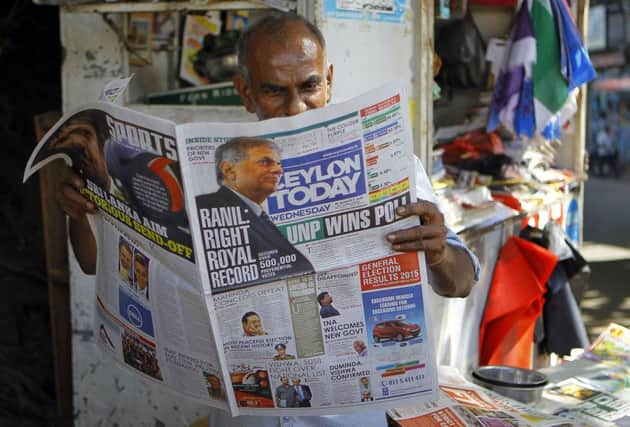Sri Lanka PM invites all parties to work together


Officials from Prime Minister Ranil Wickremesinghe’s United National Party were working to gain seven more seats to give it an outright majority and enable Mr Wickremesinghe to be sworn in for a second term as prime minister, a position second to president in Sri Lanka.
The UNP won 106 seats in Monday’s elections, seven short of a majority in the 225-member Parliament. Former strongman leader Mahinda Rajapaksa failed in his attempt at a political comeback seven months after he lost his presidential re-election bid, with his party winning 95 seats.
Advertisement
Hide AdAdvertisement
Hide AdMr Wickremesinghe said he would discuss with President Maithripala Sirisena the concept of building “consensus on our national policies.”
“I have got a mandate to put our plan before Parliament, so that we could arrive at a consensus and build a national framework within which we will do our politics,” he said. “Through this approach ... all parties could work together either in government holding a ministerial position or in Parliament through the oversight committees.”
Mr Sirisena is the leader of the United People’s Freedom Alliance, which contested Monday’s elections under Mr Rajapaksa. Mr Sirisena broke away from Mr Rajapaksa’s Cabinet last year and won an upset victory in the January 8 presidential election with support from Mr Wickremesinghe, who was opposition leader at the time. Mr Rajapaksa’s loyalists, however, compelled an unwilling Mr Sirisena to field the former president in the parliamentary elections.
Both parties have been bitter rivals for decades, and their cohabitation will be a novelty in Sri Lankan politics. An earlier cohabitation between a president and a prime minister elected from different parties ended after bickering.
In Sri Lanka, the prime minister acts for the president when he is absent and replaces him if he is impeached, incapacitated or dies. The president has wide executive powers and usually holds the defence, foreign relations and sometimes finance portfolios. The prime minister heads lawmaking and has some governance powers.
Yesterday, Mr Rajapaksa accepted the results “with humility” and said he “will continue to engage in politics in keeping with the people’s mandate and I will function within parliament to safeguard the nation and the democratic system.”
Since his presidential loss, there has been a sharp reversal of fortunes for Mr Rajapaksa, his family and friends, who were once all-powerful controllers of the nation. Some now face investigations or lawsuits on allegations of corruption, misuse of power and even murder.
Meanwhile yesterday, foreign election monitors hailed the election.